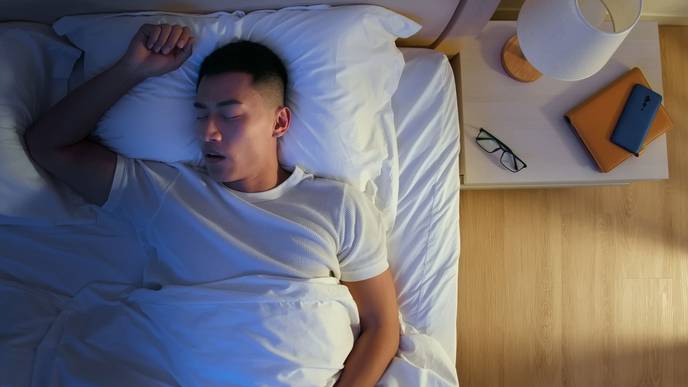ReachMD
Be part of the knowledge.™Is Snoring Bad for Your Health?

When to See a Doctor About Snoring
It’s time to see a sleep specialist when the snoring interrupts your sleep or becomes so loud that your partner complains, Kilkenny says. “This is especially true if the bed partner notices snorting or gasping noises, pausing, or stoppages in breathing that is associated with the snoring,” he says. “Also, if there are any other associated events such as restlessness at night, bathroom trips, tiredness during the day — this should trigger a trip to the doctor.”
The doctor will likely order a sleep study if they suspect you have a sleep disorder, such as OSA, according to the Cleveland Clinic. There are many potential sleep apnea treatments, including lifestyle changes, using a continuous positive airway pressure (CPAP) machine or oral device while sleeping, or surgery. It’s important to address sleep apnea because, if left untreated, it can worsen medical conditions such as heart disease or hypertension, Kilkenny says.
However, it’s entirely possible to be a snorer without sleep apnea. “Thirty percent of the population make snoring noises alone (known as primary snoring), but only 5 to 8 percent of the population has OSA,” Kilkenny says.
How to Minimize Snoring
If that sounds like you, there are some simple changes you can make to help you snore less. Keep in mind the solution to your snoring will depend on what’s causing it.
“Snoring is not a health risk in and of itself and is more of a symptom, so it depends on the cause of the snoring to address the treatment,” says Kendra Becker, MD, a sleep medicine director and internist at Kaiser Permanente in Fontana, California.
For example, you may be forced to breathe through your mouth because allergies have you chronically congested, or a deviated septum (displacement of the cartilage inside your nose) obstructs your nasal airflow. Treating those can help you breathe easier, and may reduce or eliminate your snoring.
Kilkenny also recommends:
- Losing weight if you’re overweight
- Avoiding alcohol and sedatives such as narcotics and benzodiazepines
- Taking medications to free up congestion when you’re feeling sick
- Sleeping with your head elevated
- Sleeping on your side instead of your back
- Quitting smoking
- Prioritizing sleep quantity and quality
Beyond those lifestyle changes, you can try:
Nasal Strips Designed to Keep Your Nasal Passages Open A study published in August 2018 in Allergy, Asthma, and Clinical Immunology found study participants who wore a nasal strip to bed reported an improvement in sleep quality nearly twice as high as those who used a placebo.
A Snore-Reducing Pillow “These help keep your airway open by repositioning your neck and head,” Kilkenny says, though he admits they aren’t the most powerful way to end snoring. A small study published in August 2022 in the Journal of Healthcare Engineering found using a pillow with an expansion angle of 20 degrees resulted in no snoring during the first 30 minutes of sleep, compared with five snoring episodes for those using a standard pillow.
Oral Appliances That Reposition Your Jaw to Maximize Air Flow A review of research found using an oral device while sleeping reduced snoring by 45 percent.
Surgical Procedure “Surgery is usually not recommended for simple snoring,” Dr. Becker says. And insurance companies typically don’t pay for surgical treatments for snoring, Kilkenny says. However, if you have another condition such as OSA, you may benefit from surgery to remove tissue from your mouth or throat. A device called a pillar implant can also be used to stiffen the soft palate, and was found to reduce the frequency and loudness of snoring among participants in a small study published in July 2021 in Future Science OA.
What are the chances you can implement the above and stop the snoring for good? “Everything is relative, but if one improves these conditions, the snoring should improve,” Kilkenny says. However, he adds that anatomy is still the major reason snoring develops, and that is more difficult to fix.
Facebook Comments